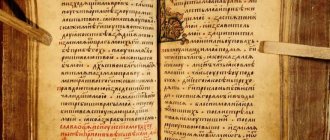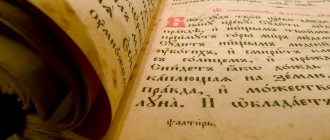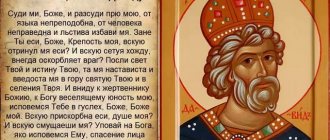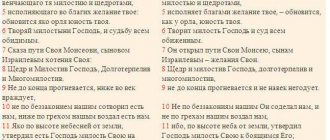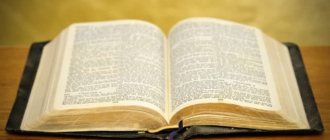The Psalter includes songs of praise, gratitude, supplication, and lamentations. Many psalms were written by the psalmist David, who contributed greatly to the spread of Christianity.
There are songs in holy scripture that were created after David. Some of them were created by clergy, others by the descendant of Solomon himself. The psalm was created several decades after the end of the reigns of both David and his son. This prayer is important for the righteous.
Psalm 126
The Psalter consists of songs of thanksgiving, praise, petition and songs of lamentation.
Many people know the psalmist, king and prophet David, who wrote many prayers important for Christianity. However, the Psalter includes songs that were created over 800 years and not all of them were written by David. The songs were written by various clergy and even King Solomon's son, but Psalm 126 was written several decades after Solomon's reign. Yet this psalm is extremely important.
Text of prayer Psalm 126
In Church Slavonic with accents
1 Unless the Lord builds the house, those who build it labor in vain. Unless the Lord preserves the city, watch in vain.
2 It is in vain that you will grow gray, eating the bread of sickness, when He gives sleep to His beloved.
3 Behold the heritage of the Lord, the reward of the fruit of the womb.
4 Like arrows in the hand of a mighty man, so are the sons shaken off.
5 Blessed is he who gets his desire from them. They will not be ashamed when they speak against their enemies in the gates.
In Russian
1 Unless the Lord builds the house, those who build it labor in vain; If the Lord does not guard the city, the watchman watches in vain.
2 In vain do you rise early, sit up late, eat the bread of sorrow, while He gives sleep to His beloved.
3 This is the heritage of the Lord: children; the reward from Him is the fruit of the womb.
4 Like arrows in the hand of a mighty man, so are young sons.
5 Blessed is the man who fills his quiver with them! They will not be left in shame when they speak to their enemies at the gates.
History of writing
In some versions of the text of Psalm 126 there is a postscript “Solomon”, but this speaks not of time, but of place. Under King Solomon, a temple was built in Jerusalem, which was destroyed during the captivity of the Jews. When, after many years, the Jewish people returned to Israel, they set about restoring the temple.
Psalm 126 is part of the Song of Ascension, a collection of psalms sung during the festival sacrifices in Jerusalem. The text contains a description of the relationship between people, their voluntary work to restore the temple and the relationship between man and God. People get tired of work, quarrel and argue, which interferes with work, and only trust in God's will and help saves the people.
When to read Psalm 126?
The song can be considered eternal and always relevant, since it draws attention to the most important gift of the Lord - children. Psalm 126 should be read with gratitude and praise. It is used in petitions for consolation and blessing in various matters.
Any prayer strengthens faith and enriches the soul, and reading Psalm 126 can also bring good luck. Hope and sincere faith in the Lord will be a support in all situations; the Lord will always help his servant not to go astray from the right path.
Interpretation of Psalm 126
The song was written for specific events that happened to the Jewish people, but over time it became universal. Any Christian should know the text of Psalm 126, since the main idea that can be traced in it is that one should rely only on the Lord and follow His will in any situation.
The interpretation of Psalm 126 is best analyzed verse by verse:
- Verse 1 - more than one thing, the structure and decision will not be successful unless there is the blessing of the Lord. The house here acts as a collective concept, by which one should understand not only the building, but even the family.
- Verse 2 – with God’s mercy, any work will be successful, while work that is displeasing to the Lord from morning to night will not bring either worldly blessings or peace. The righteous, blessed by God, will find peace and sleep.
- Verse 3-5 – God’s greatest mercy is children. They are never born without the will of the Lord, so they should be accepted as a gift, as a gift from God. For a wise person, children will be support and weapons, like arrows in a quiver, which should serve for the good, that is, be raised correctly.
Reading rules
There are no strict rules when performing songs from the Psalter, but there are a number of recommendations. At home, you are allowed to read Psalm 126 in Russian, but it is advisable to do this in front of icons and with a lit candle. The words do not need to be spoken out loud, since the Lord also hears the thoughts of believers. You should not turn to prayer if its text is unclear and not close. You should understand the interpretation of the psalm, and perhaps contact a clergyman for clarification. A sincere prayer, even if it has not been memorized, will be heard by the Lord, and the request will be fulfilled.
Song of Degrees, 125
1 Whenever the Lord returned the captivity of Zion, it would come as a consolation.
2 Then our lips were filled with joy and our tongues were filled with gladness, then they said among the nations, “The Lord has made great what he has done to them.”
3 The Lord has magnified what he has done to us: we were rejoicing,
4 Return, O Lord, our captivity, like the floods of the south.
5 Those who sow with tears will reap with joy.
6 Those who walk walk and weep, throwing their seeds, but those who come will come with joy, taking up their hands.
Psalm of David 126: The Lord's Inheritance
The psalmist David is known in all Christian religions. His psalms are read as prayers, sung and used as spiritual reinforcement. The king wrote these short poetic prayers in certain situations and their meaning varies. Some psalms are repentant, some are a petition for the protection or mercy of the Lord, others sing of God's beauty and love.
It should be clarified that not all the songs in the Psalter belong to the hand of King David (although most of them do), some were written by temple servants, and others by David’s son Solomon. Psalm number 126 was written 7 generations after the reign of Solomon. Why is it so important for Christians and what is it about?
History of creation
The psalm is included in the so-called Song of Ascension - a collection of psalms that were sung during the festive ascent to the Jerusalem Temple for sacrifice.
At the beginning of the song there is a postscript “Solomon”, which speaks not about the authorship of this king, but about the time period. Solomon built a temple in Jerusalem, which was destroyed and looted during the time when the Jews were taken into captivity. Several decades later, they returned to Israel and restored the temple.
Song 126 was written during the restoration period, and King Solomon had nothing to do with its writing.
About other psalms of David:
This song also reflects the author's attitude towards human relationships. The construction and restoration of the sanctuary was carried out by ordinary people who were no strangers to passions and strife, so work was often suspended. People could only trust in the Lord and ask Him for help and mercy.
The psalm was created to encourage and teach the people about God's leading, bringing the people's thoughts back to the many prophecies about Israel's sin, captivity and deliverance. It is essentially a poetic retelling of Jeremiah's prophecy about the fall and restoration of Israel.
The meaning of the psalm
Even though the historical context relates to a specific people (the Jews), Christians today can take a lot of useful information from this text.
This text is not only about national significance, but also about family worship. The author encourages us to look to the Lord and hope in Him in any life circumstances. In addition, he draws the reader's attention to the true wealth that is given by the Lord - children.
Important! As you read this text, you should thank the Lord and praise Him for His mercy. And also ask for success in every endeavor and consolation.
To interpret, you should initially know the full text:
- If the Lord does not build the house, those who build it labor in vain; If the Lord does not guard the city, the watchman watches in vain.
- It is in vain that you rise early, sit up late, eat the bread of sorrow, while He gives sleep to His beloved.
- This is the inheritance from the Lord: children; the reward from Him is the fruit of the womb.
- Like arrows in the hand of a mighty man, so are young sons.
- Blessed is the man who fills his quiver with them! They will not be left in shame when they speak to their enemies at the gates.
It is best to analyze the song verse by verse to understand the depth of the author’s thoughts:
- Any family, royal or simple, must rely only on the Lord in all matters. One's own ingenuity will not save a person unless the Lord blesses him. The concept of “house” here means both a building and a family.
Reading rules
Since Psalm 126 is part of Scripture, there are no specific rules for reading it. But you should follow certain recommendations:
- light a candle or lamp before reading;
- read silently or quietly out loud;
- while reading, you can sit, but get up on the “glory”;
- do not be upset if the text is not clear, but seek help from an interpreter or a clergyman.
Any reading of spiritual literature enriches the soul, and reading a psalm for good luck means strengthening your faith in the Lord and having hope for his support.
History of writing
Some examples of Psalm 126 are signed by Solomon, but this indicates not the date or the psalmist, but the location. During the reign of this king, a temple was erected on the lands of Jerusalem, which was destroyed during the captivity of the Jews. At the end of the years, when the captives returned home from Babylon, they restored it.
Psalm 126 itself talks about the relationship between different people, their labors in building the temple, as well as the relationship between God and the righteous. The verses describe how people, despite fatigue, quarrels and disputes that interfere with their work, continue to move towards their goal with the help of the Lord's trust.
Psalm 126 - text in Russian, interpretation, why they read it
In the book of Psalms, each chapter is unique. This is a separate poetic work, filled with deep philosophical and religious meaning. Psalm 126 is part of a whole galaxy (from 119 to 133), united by a common theme - they are called songs of ascension. Many composers have written music to this text, although it is quite short and contains only five lines. In what cases is this biblical chapter read, what thoughts did the author want to share? Find out from the article.
Psalm 126 - text in Russian
| Song of Degrees | Song of the Steps. |
| 1 Unless the Lord builds the house, those who build it labor in vain. If the Lord does not preserve the city, its strictness will be in vain. | 1 If the Lord does not build the house, the builders have labored in vain; If the Lord does not preserve the city, the watchman has watched in vain. |
| 2 It is in vain for you to have learned in vain; you will rise up gray, eating the bread of sickness, when He gives sleep to His beloved. | 2 It is in vain for you to greet the dawn, to rise after sitting, to eat the bread of sorrow, when He gives His beloved sleep. |
| 3 Behold the heritage of the Lord's sons, the reward of the fruit of the womb. | 3 Behold, the inheritance of the Lord is sons, the reward is the fruit of the womb. |
| 4 Like arrows in the hand of a mighty man, like sons who have been shaken off. | 4 Like arrows in the hand of a mighty man, so are the sons of exiles. |
| 5 Blessed is he who gets his desire from them. They will not be ashamed when they speak against their enemy in the gates. | 5 Blessed is he who fulfills his desire through them: they will not be ashamed when they speak to their enemies in the gates. |
Historical information
If this is not your first time encountering this topic, then of course you know that the author of most texts from the Psalter is King David. But in this case his son, Solomon, is indicated. However, many researchers are inclined to think that he was only the addressee to whom the psalmist’s thoughts turned. Moreover, in the second part of the work we are talking about the fact that a father can be proud of his young sons.
Psalm 126 has a fairly clear general meaning, which is already included in the first lines:
- any business that people begin will be in vain if God does not bless it;
- children, especially sons, are not only a source of pride, but also a reward from the heavenly Lord;
- when the time of testing comes, those who have been faithful to the Lord will be able to easily defend themselves from their enemies.
The Greek translation from which the Church Slavonic was made is distinguished by a number of inaccuracies. For example, the fourth line talks about sons born in youth (and not sons expelled).
Interpretation of Psalm 126
If you read these verses in Church Slavonic, it will be quite difficult to immediately understand what they are talking about. The meaning is much clearer if you take the work in Russian. Although in this case the translations will differ. We have already talked about one discrepancy, there is another. We are talking about the second stanza. It talks about how futile the efforts of those who try to earn a living by devoting all their free time to work are.
In contrast to the disembodied vanity of those whose hearts do not know God, the faithful are brought to whom everything that is necessary is given easily. This is not surprising: when something is blessed by the Lord, then everything goes like clockwork, and His servants do not need anything. But in the second part of the stanza, the translations of Psalm 126 diverge:
- one (particularly Slavic) says that the Lord sends a dream to his beloved children;
- in others (German, for example) it is said that God gives what is needed while his children sleep peacefully - that is, they do not care about anything at all.
More correct translations can be found among Protestants, for example, Martin Luther. He did it not from the Greek, but from the Hebrew original.
In any undertaking, be it building a temple or taking care of one’s own well-being, a person will fail if the Lord does not bless him. Researchers believe that the Jews chanted Psalm 126 while they were building the second Temple in Jerusalem. Faith in God supported them in this difficult task. Firm confidence in His help is expressed in biblical lines.
- Psalm 118 - text in Russian;
- Look here Psalm 126;
- Psalm 45 - text in Russian: https://bogolub.info/psalom-45/.
How does Psalm 126 help?
Not every believer knows why Psalm 126 is read. At one time, the holy fathers compiled a whole list of situations in which it was necessary to turn to a particular text. This chapter from the Bible is pronounced in the following cases:
- to drive away evil demons;
- to keep livestock free from disease and disturbance;
- the text provides powerful protection from magicians, psychics, and sorcerers;
- helps avoid the harm that evil people try to cause.
You can read it in any translation. According to tradition, while reading the Psalter, it is not necessary to stand even in church, so you can read the psalms while sitting at home. The Holy Fathers advise after Psalm 126 to say the protective prayer “May God rise again,” but it is better to say the entire 4th kathisma.
It is believed that songs of ascension were sung by the priests as they climbed the steps of the temple to the part of it where only men were allowed. According to the number of these steps, of which there were 15, the corresponding number of psalms was written, among them the 126th.
Explanatory Bible Commentary on the Psalter
Only in the Hebrew Bible does this psalm indicate the name of the author Solomon, but in the Vulgate and the LXX there is no last addition, which can be explained by the fact that 70 translators found it difficult to place the name of Solomon, as a writer, above that psalm, which is included in the category of “songs.” ascension”, written during the return or upon return from Babylonian captivity. Meanwhile, the content of the psalm, where the writer preaches about man’s complete submission to God and life according to His guidance, and not according to one’s own strength, is completely consistent with the content of the works of Solomon (Book of Proverbs and Ecclesiastes), where the latter puts “the fear of the Lord” as the basis for human behavior "(Eccl. 12:13–14) and where he proves the meaninglessness of man’s attachment to the earth. The inclusion of this psalm, written by Solomon, in the category of songs of ascension by the compilers of the canon is probably explained by the fact that this psalm, preaching complete devotion to the Lord, was most often used by the Jews returning from captivity at the time when they were building the second temple and when this the path encountered numerous obstacles, insurmountable by their strength, and therefore their steadfastness in the matter and confidence in its completion could only be nourished by faith and hope in God, which is what the said psalm speaks of.
If the Lord does not show favor to a person, then all his attempts and efforts to strengthen his well-being are in vain; The Lord gives tranquility and peace only to those whom He loves (1–2). This is an expression of Divine favor - children who are the same protectors for their parents as for the archer his arrows, with which he will confront the enemies of the people at the gates of the city (3-5).
Ps.127:1. If the Lord does not build the house, those who build it labor in vain; If the Lord does not guard the city, the watchman watches in vain.
Ps.126:2. It is in vain that you rise early, sit up late, eat the bread of sorrow, while He gives sleep to His beloved.
The words of these verses have a special meaning in the mouth of Solomon, who became famous for his grandiose buildings of the temple and palaces, on the construction of which many architects and craftsmen of that time worked, which is why it would seem that a person’s perseverance and efforts are always crowned with success. Solomon says the opposite. The meaning of his words is that every human work begun with the blessing of the Lord will be crowned with success, but that which is not built with the blessing, but especially contrary to His will, no matter what the person’s efforts, will end in failure. An example of the latter is the building of the Tower of Babel after the flood, which is an expressive monument not of how great is the effort of man and how fruitful is his genius, but of how fruitless all his efforts are if they are directed against God or provoke His wrath. - “He gives sleep to His beloved” - not in the sense that whoever the Lord loves can do nothing, but in the sense that he who creates in accordance with the will of God and at His command can be at peace for the successful completion of his work, since finds protection in the Almighty Being. In relation to the situation of the Jews after the captivity and their concerns about the construction of the second temple, these words could fill them with confidence that no matter how great the obstacles they encountered on their way, the construction work would end in success, since it was in accordance with the will of God, and therefore, the Jews drew strength and energy here to continue it.
Ps.126:3. This is the inheritance from the Lord: children; the reward from Him is the fruit of the womb.
Ps.126:4. Like arrows in the hand of a mighty man, so are young sons.
Ps.126:5. Blessed is the man who fills his quiver with them! They will not be left in shame when they speak to their enemies at the gates.
The ancient Jews saw the abundance of children as a sign of Divine favor. The writer finds out the meaning of what is the external benefit of many children and what is the Divine favor here: children are the protection of their parents, and children are also the protection of the city and the fatherland from enemies when they come to the defense of both during attacks.
Psalm 126 – listen and read the text. Interpretation.
Old Testament
Psalter
- Book of Genesis
- Book of Exodus
- Book of Leviticus
- Book of Numbers
- Book of Deuteronomy
- Book of Joshua
- Judges
- Book of Ruth
- 1st Book of Samuel
- 2 Samuel
- 1st Book of Kings
- 2nd Book of Kings
- 1 Chronicles
- 2 Chronicles
- Book of Ezra
- Book of Nehemiah
- Book of Esther
- Book of Job
- Psalter
- Book of Proverbs of Solomon
- Book of Ecclesiastes
- Book of Song of Songs
- Book of the Prophet Isaiah
- Book of the Prophet Jeremiah
- Book of Lamentations
- Book of the Prophet Ezekiel
- Book of the Prophet Daniel
- Book of the Prophet Hosea
- Book of the Prophet Joel
- Book of the Prophet Amos
- Book of the Prophet Obadiah
- Book of the Prophet Jonah
- Book of the Prophet Micah
- Book of the Prophet Nahum
- Book of the Prophet Habakkuk
- Book of the Prophet Zephaniah
- Book of the Prophet Haggai
- Book of the Prophet Zechariah
- Book of the Prophet Malachi
Sorry, your browser does not support viewing this video. You can try downloading this video and then watch it.
Here you can listen and read the text of Psalm 126
Interpretation of Psalm 126
The psalm is attributed to King Solomon. The mood of the psalm and its main idea testify to him as the author - about the complete dependence of man, in all his deeds, on God. Let people not rely on their own strength and efforts! This same thought largely determines the content of such works of Solomon as Proverbs and the book of Ecclesiastes.
It can be assumed that, like the Song of the Ascent of Ps. 126 was very popular among the builders of the second temple in the post-exilic period. As you know, they had to overcome many difficulties and obstacles and resist intrigue. The hope that, ultimately, their work would be crowned with success, they could only draw from their trust in God.
A. Labor is in vain without God's blessing (126:1-2)
Ps. 126:1-2
. No matter what house those who build it work on, their labor is in vain, just as the watchman at the gates of a city watches in vain, unless the Lord builds... unless He guards. These words are always true, but in the mouth of Solomon, who became famous as the king-builder, under whom the first temple was built, they acquired a special meaning - after all, he was immensely rich, and his palaces, his temple were built by the best craftsmen of his time. It would seem that success in any construction was guaranteed to him.
But here he is, the psalmist, who says that without the blessing of the Lord, human labor is in vain. This is the meaning of verses 1-2. One can imagine how much they corresponded to the mood of the builders of the second temple or the walls of Jerusalem, how much they inspired hope and confidence in them, who created in conditions directly different from those in which Solomon “built”, but who trusted in the same God.
Early rising and late going to bed, meager bread with hard work - all in vain if this work is not blessed by the Lord, Who gives sleep to His beloved (in the sense that He gives to the one who trusts in Him a feeling of confidence, which during the hours of rest allows him to sleep calmly); verse 2.
B. Children are evidence of God's favor (126:3-5)
Ps. 126:3-5
. Children were considered in ancient Israel as a sign of God's favor: the more of them a person has, the more pleasing he is to the Lord. Young sons are compared to arrows in the hand of a strong man, for they are always in defense not only of their family, but also of the city.
You can learn more about God and the Bible on the website The Bible about God
Strong help from prayer Psalm 126
In the Orthodox Bible, Psalm 126 is attributed to Solomon by borrowing from the Hebrew, since its authorship is not indicated in the Greek and Latin translations. Meanwhile, the interpretation of Psalm 126, despite its laconicism, is quite confusing: it is believed that it touches on the theme of the liberation of the Jews from Babylonian slavery, the time of which does not coincide chronologically with the life of Solomon, and at the same time contains an edification about humility, the meaning of which is almost completely coincides with the teachings of Solomon in the Book of Proverbs. Historians believe that Psalm 126 was sung during the construction of the second temple, acting as a kind of spiritual support for the Jews in this difficult task.
Christian Psalm 126 is a prayer for peace
The author of the text of Psalm 126 says that any business begun with God’s blessing will certainly be crowned with success, and on the contrary, those who self-righteously rely only on their own human strength will be put to shame. The words “He will give sleep to His beloved” (Ps. 126:2) indicate that any work undertaken by a righteous person will be crowned with peace and tranquility, and at the end of it he will be able to rest peacefully. Reading, listening and watching a video with the text of Orthodox Psalm 126 is recommended for those who want to maintain peace in the family.
Listen to Psalm 126 on video in modern Russian
Read the church text of the prayer Psalm 126 in Russian
Song of Ascension. Solomon.
If the Lord does not build the house, those who build it labor in vain; If the Lord does not guard the city, the watchman watches in vain. It is in vain that you rise early, sit up late, eat the bread of sorrow, while He gives sleep to His beloved. This is the inheritance from the Lord: children; the reward from Him is the fruit of the womb. Like arrows in the hand of a mighty man, so are young sons. Blessed is the man who fills his quiver with them! They will not be left in shame when they speak to their enemies at the gates.
Orthodox Psalter, text of Psalm 126 in Church Slavonic
Unless the Lord builds the house, those who build it labor in vain; If the Lord does not preserve the city, it will be in vain. It’s in vain for you to exercise; You will arise from your gray hairs, having eaten the bread of sickness, when you have given sleep to your loved ones. Behold, the son's heritage of the Lord, the reward of the fruit of the womb. Like arrows in the hand of a strong man, like sons shaken off. Blessed is he who fulfills his desire from them; They will not be ashamed when they speak to their enemies in the gates.
Song of Degrees, 127
1 Blessed are those who fear the Lord, who walk in His ways.
2 Bear the fruits of your labors: blessed are you, and good will come to you.
3 Your wife is like a vine and fruitful in the countries of your home,
4 Your sons are like new olive trees around your table.
5 Behold, the man who fears the Lord will be blessed.
6 The Lord will bless you from Zion, and you will see the good of Jerusalem all the days of your life,
7 And thou shalt see thy sons' sons. Peace on Israel.
